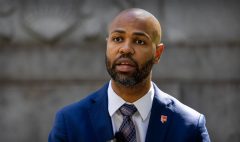UPenn senior lecturer examines Islamophobia and other long-term effects of 9/11
October 31, 2024 2024-11-20 18:45UPenn senior lecturer examines Islamophobia and other long-term effects of 9/11

UPenn senior lecturer examines Islamophobia and other long-term effects of 9/11
On September 23rd, in one of the first installments of the “Meeting the Moment” series of events, Haverford invited University of Pennsylvania Senior Lecturer Dr. Ameena Ghaffar-Kucher to discuss how 9/11 has influenced American foreign and domestic policy since its occurrence.
Advertised in an email sent to Haverford students by Dean John McKnight promoting the four September installments of “Meeting the Moment”, this event provided an in-depth analysis of how 9/11 and existing American prejudices combined to influence the direction of American policy in the past two decades. The email’s description of the event displayed a conspicuous absence of any reference to Islamophobia or prejudice, characterizing it solely as an analysis of the political impacts of 9/11.
Event description from a 09/17 email from Dean of Students John McKnight:
Join us for in-depth exploration of how 9/11 has reshaped U.S. domestic and foreign policy over the past 23 years. Through an overview of key policies across four presidential administrations, Amena Ghaffar-Kucher will examine the enduring impacts of the 9/11 wars, evolving surveillance strategies, and shifting U.S. priorities in the Middle East. By connecting these policies to broader trends in counterterrorism and security, this event highlights the lasting influence of 9/11 on American governance and global power.
Although this seeming omission was the source of some concern among students, Dr. Ghaffar-Kucher did not shy away from the topics of Islamophobia, in fact making it a focal point of her presentation on U.S. foreign policy and its subsequent discussion, and included additional mentions regarding anti-Arab and anti-Palestinian sentiments.

Dr. Ghaffar-Kucher began her presentation with a timeline of significant events between 9/11 and today in order to demonstrate its lasting impact. She made it clear in her presentation that structural Islamophobia in the United States is not solely tied to 9/11, but rather is part of perennial fears of a greater “Islamic peril.” She emphasized the far-reaching dangers of Islamophobia, asserting that it affects not solely Muslims, but anyone perceived to be Muslim. This segued into an analysis of three distinct—yet often overlapping—forms of bigotry: Islamophobia, anti-Arab racism, and anti-Palestinian racism. Dr. Ghaffar-Kucher explained that Anti-Arab racism promotes stereotypes of Arabs as backwards and violent, and anti-Palestinian racism depicts them as terrorists when they resist occupation by Western powers. Anti-Palestinian racism, she clarified, also extends to those who support Palestine irrespective of race, religion, or ethnicity. She explained that these prejudicial attitudes are among the reasons why so many Americans support Ukraine but not Palestine, explaining that through a prejudice-warped lens, the 42,000+ Palestinian civilian casualties “are not worthy of our tears.”
Dr. Ghaffar-Kucher attributed the “perpetual war on terror” to these same attitudes. She explained that Islamophobia has been used to justify America’s imperialist actions during the war on terror under every American president since 9/11. Presidents Bush and Obama both acknowledged that terrorists are not representative of Muslims altogether—a sentiment not shared by President Trump—yet escalated counterterrorism measures that primarily impacted Muslim civilians. Dr. Ghaffar-Kucher wrapped up her presentation by discussing the popular narrative surrounding Muslims, Arabs, and Palestinians. She stated that the media contributes to these narratives by reinforcing sensationalized stereotypes of Muslims that frame them as perpetual suspects. This, she elaborated, has historically shaped public perceptions of Muslims in a negative fashion. She concluded by asserting that this history remains relevant today, particularly with the looming presidential election, and encouraged students to educate themselves with resources like “Teaching Beyond September 11th” in order to rectify the failure of many schools to properly teach these issues.

Transitioning the event into the Q&A portion, Dr. Ghaffar-Kucher began with a question for the audience, asking if anything in the presentation had surprised them. One student in attendance responded, expressing surprise that many Americans view 9/11 as a unifying force, explaining that in his and his parents’ experience the opposite was true. Several of the questions asked by the audience centered around the impact of presidential rhetoric in relation to presidential actions. Dr. Ghaffar-Kucher elucidated that while little distinguished the counterterrorism policies of Presidents Bush, Obama, Trump, and Biden, the “overt Islamophobia” in Trump’s rhetoric made him far more dangerous and legitimized hate crimes and harassment. When a question shifted the discussion towards the pro-Palestinian protests across college campuses, Dr. Ghaffar-Kucher shared her own anxieties about giving this presentation, anxieties developed as a result of rampant anti-Palestinian sentiment on campuses. She concluded the Q&A section by sharing a personal story about her son’s teacher intended to demonstrate the normalization of Islamophobia in the United States.
Reached for comment after the event, Dr. Ghaffar-Kucher responded to questions regarding the impacts of bigotry. She provided insight on how the prejudicial trifecta of Islamophobia, anti-Arab racism, and anti-Palestinian racism have combined to influence Western perspectives on Palestine and Israel. “Negative views of both Arabs and Muslims stretch back hundreds of years, and the events of 1948 further vilified Arabs,” she explained, claiming that demonizing Arabs, Muslims, and Palestinians “has helped justify policies and attitudes that dehumanize Palestinians and legitimize occupation,” something particularly evident in American foreign policy. She believes some who hold such prejudices are acting out of ignorance, which in turn is derived from an intentional “suppression of [Palestinian] history.” When asked about Islamophobia, anti-Arab sentiment, and anti-Palestinian sentiment on college campuses, Dr. Ghaffar-Kucher immediately pointed out that these prejudices are “not new on U.S. campuses.” She cited the fact that “many university leaders refused to name Palestine in their messages after October 7” as an example of both these prejudices and the aforementioned ignorance that fuels these beliefs, criticizing these administrators’ unwillingness to question why they refuse to acknowledge Palestine, adding that “willful ignorance has been incredibly harmful.” Explaining that such prejudice manifests in many ways, she highlighted the particular prominence of anti-Palestinian racism in the past year, lamenting “the backlash against student activism and civil disobedience—acts that are often celebrated in history.” She added that these three forms of prejudice “often intersect, leading to a compounded effect of discrimination.”

One cause for hope, however, is in college students’ efforts to combat these prejudices. Dr. Ghaffar-Kucher highlighted how students “are creating inclusive spaces for dialogue, supporting one another, and actively challenging harmful stereotypes.” She praised the students’ initiative in educating themselves and one another, as well as their coalition-building across groups. In particular, she expressed appreciation of the “Muslim-Jewish solidarity we’ve seen over the past year,” that challenges “all forms of oppression, including Islamophobia and antisemitism.” A major issue, she elaborated, “lies with our campus leaders…the Palestinian exception to free speech is a dark stain on our history, and history books will not look kindly on these leaders,” adding that they must confront their prejudices and recognize their complicity “in the various forms of oppression that exist on college campuses, whether that is anti-Palestinian sentiment, antisemitism, anti-Blackness, or Islamophobia.”







